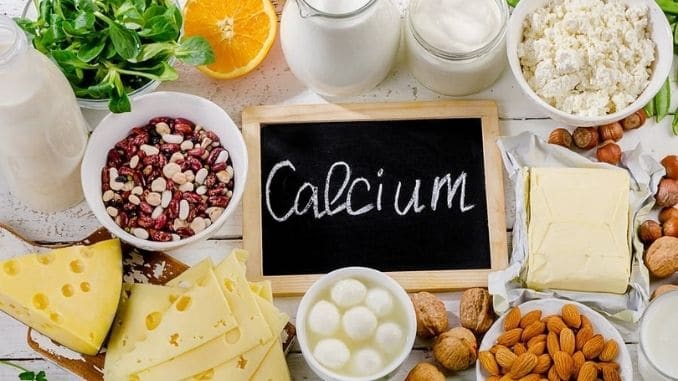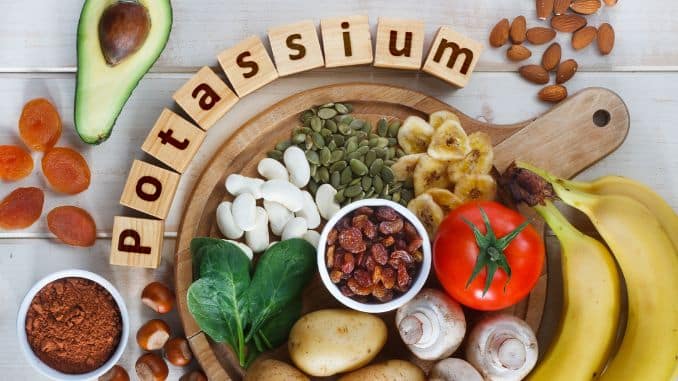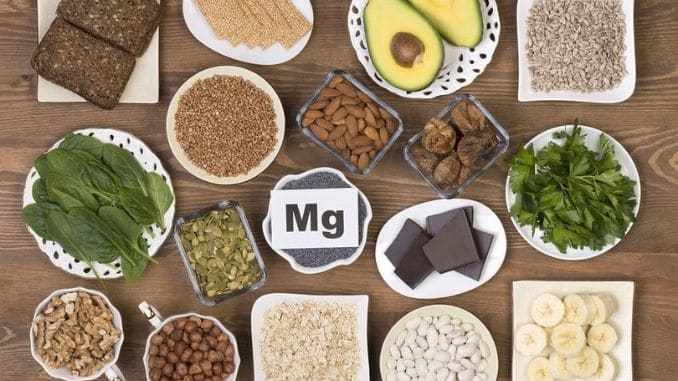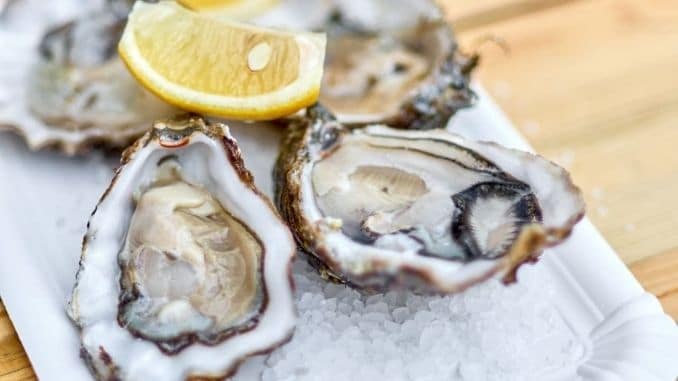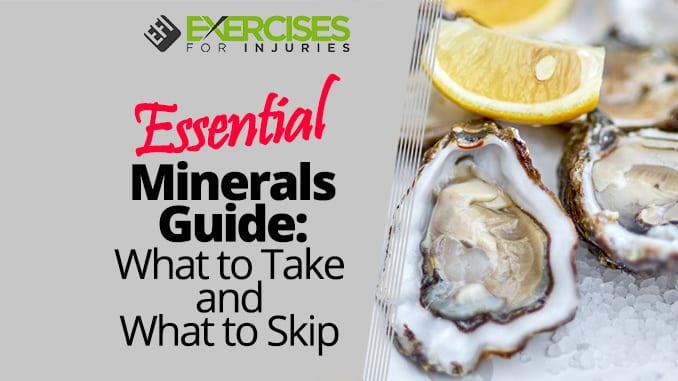
Calcium, potassium, magnesium, phosphorus, and sodium are generally considered the major essential minerals. Minerals that the body needs, in less quantity, include copper, iron, manganese, and zinc. In this article, let’s dive into the Essential Minerals Guide, and look at what to take and what to skip.
In this Essential Minerals Guide, let’s first define an essential mineral. An essential mineral is generally defined as a vital chemical element that the body cannot produce and is not provided by other essential nutrients. In this guide, we’ll provide information on which minerals you can easily obtain by eating a healthy diet, and the ones you might want to supplement to meet the recommended daily allowance (RDA).
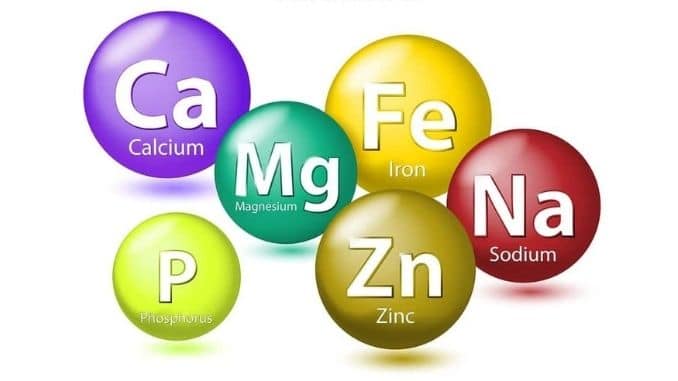
Essential Minerals Guide
1. Calcium
On the Earth, calcium is the fifth most abundant element. It is classified on the periodic table as an alkaline Earth metal. For the body, calcium is an electrolyte of paramount importance. Dr. William Sears, the author of “The Family Nutrition Book,” wrote, “Just as lime is necessary for strong concrete, calcium is needed for strong bones.
Calcium is continually deposited into multiplying bone cells, like the cement that holds together the particles of stone and sand in a chunk of concrete.”
Aside from the formation and support of strong teeth and bones, calcium is particularly crucial for the health of the body’s circulatory system, nervous system, muscle growth, development, and sustenance. Let’s see this Essential Minerals Guide.
-
How Can I Get The Recommended Amount Of Calcium?
The recommended daily amount of calcium differs for each age group and station in life. Based on the National Institutes of Health (NIH) standards, senior citizens, pregnant and lactating women require a higher amount of calcium — up to 2,000 milligrams — while average weight, middle-aged adults may need as little as 1,000 mg each day to meet the minimum RDA.
Moreover, if you eat dairy products a few times each day, it’s fairly easy to meet the minimum standard. One serving of yogurt will net you around 400 mg of calcium. You’ll get similar amounts from a generous helping of cheese. If you aren’t into dairy products, a cup of calcium-fortified orange juice contains around 300 mg of calcium. And a serving of almond milk comes in at 200 mg.
Another consideration with calcium is how to keep what you have and use it. If you drink a lot of coffee, strong tea, or soft drinks, the calcium you consume will be eliminated quickly without being absorbed into the body for efficient use.
-
Calcium Supplements — Take Or Skip?
If you know you’re not getting all of the calcium you need from your diet, or if you consume caffeine daily, swing by the local natural foods store and speak with the staff about their most bioavailable calcium supplements.
As a general rule, Dr. Sears recommends calcium carbonate because it contains a higher percentage of usable calcium for the body. Dr. Sears also recommends taking a calcium supplement with meals twice a day, rather than one large dose each day. The body can absorb usable calcium better in small doses and with food. He says, “If a higher dose calcium tablet is a better buy, break it in half.”
2. Potassium
Another essential mineral in the electrolyte category is potassium. The human body needs potassium to help balance and control blood pressure. According to the United States National Library of Medicine, your body also needs potassium to build protein and muscle, break down and use carbohydrates, control the electrical activity of the heart, maintain normal body growth and control the acid-base balance within the body.
-
How Can I Get The Recommended Amount Of Potassium?
The NIH states that average healthy adults need 4.7 grams of potassium each day. A few excellent sources of potassium include most dried fruits, avocados, beans and salmon.
-
Potassium Supplements — Take Or Skip?
If your idea of getting some extra potassium is a banana in the morning, then you might need a supplement. A medium-sized banana contains slightly more than 400 mg of potassium.
While most people do get some potassium in their diets, it takes some serious intention to get all of the recommended 4.7 grams of the mineral each day from food sources. According to Medical News Today, less than 2 percent of people in the U.S. consume enough potassium.
Furthermore, if you have healthy kidneys, it’s wise to consider taking a potassium supplement each day. However, it’s advisable to consult with your medical professional before beginning potassium supplementation. Too much potassium can be particularly dangerous for people with kidneys that aren’t fully functional.
3. Magnesium
Another mineral that’s both an electrolyte and an alkaline earth metal like calcium is magnesium. According to the U.S. National Library of Medicine, magnesium is needed for more than 300 biochemical reactions in the body.
Among other functions, magnesium strengthens our immune systems, helps us maintain muscle and nerve functions, regulates our blood sugar levels, and also keeps the heart beating steadily. Recent studies indicate that dietary magnesium can also help alleviate migraine headaches, prevent adult-onset diabetes, and promote good mental health. Let’s check this Essential Minerals Guide.
-
How Can I Get The Recommended Amount Of Magnesium?
Most adult males need 400 to 420 mg of magnesium each day. Women need less — between 310 and 320 mg per day. Dietary magnesium can be found in pumpkin seeds, peanuts, sunflower seeds, cocoa powder, dark leafy greens — particularly cooked spinach — and avocados.
One big bonus: you can get 16 percent of your magnesium needs by indulging in a 1-ounce square of very dark chocolate. Get the remaining 84 percent of magnesium your body needs by eating at least one big salad each day, topped with seeds and avocado slices.
-
Magnesium Supplements — Take Or Skip?
Unless your doctor specifically recommends it, skip magnesium supplements. It’s easy to get too much magnesium from supplements. Too much can be toxic. Nutrition expert, Michelle Fisk wrote, “Magnesium also competes with other minerals for absorption into your body, such as calcium. So, too much magnesium can cause a deficiency in other minerals.”
4. Phosphorus
Phosphorus is an electrolyte mineral necessary for all kinds of vital bodily functions. We need phosphorus to contract and move the muscles in our bodies. Phosphorus also aids in the building and strengthening of bones and teeth in our bodies. Phosphorus is the mineral responsible for the production of DNA. Additionally, it helps the body to grow and repair tissue cells.
-
How Can I Get The Recommended Amount Of Phosphorus?
Eating meat or fish regularly will help you get enough dietary phosphorus. Eggs, beans, and dairy products also contain high levels of phosphorus.
-
Phosphorus Supplements — Take Or Skip?
Because it’s fairly easy to obtain optimal levels of phosphorus through diet alone, most people should skip phosphorus supplements. However, certain medications, such as insulin, antacids, ACE inhibitors and corticosteroids can cause a phosphorus deficiency. If you take the above medications, you may want to consult with a doctor to have your phosphorus levels tested.
5. Sodium
Sodium is an essential electrolyte mineral that’s necessary for nerve and muscle operation. It is also needed to help balance blood pressure and regulate the fluid in our cells. Let’s move on to this Essential Minerals Guide.
-
How Can I Get The Recommended Amount Of Sodium?
It’s far more common for people to consume too much sodium than not enough. Sodium is found in most of the foods we consume — even fruits and vegetables. Processed and packaged foods tend to have the most sodium. Salad dressings, sauces and soups also have loads of sodium.
-
Sodium Supplements — Take Or Skip?
Hyponatremia is the medical name for sodium deficiency. It’s a very serious condition that can eventually affect the normal functions of the brain. Those prone to hyponatremia are older adults, people taking antidepressant medications, people with kidney disease and folks who use diuretics.
Fortunately, most of us can skip sodium supplements. However, if your doctor finds that you are sodium deficient, electrolyte drinks may help bring your levels back to normal. Similarly, just adding table salt to your meals will help.
6. Iron
Looking to build up your biceps? Iron helps the body provide connective tissue to support those big guns while you flex. For your red blood cells to carry oxygen throughout the body, you need iron. For your body to manufacture certain hormones, you need iron. Without this essential trace element, our bodies would cease to function. Below is this Essential Minerals Guide.
-
How Can I Get The Recommended Amount Of Iron?
Egg yolks, beef or pork liver, red meat, and dark-meat poultry are all excellent sources of iron. On the vegetarian side, add chickpeas or hummus to your diet. Chickpeas are a fantastic source of iron. Likewise, breakfast cereals, bars, and granola are often loaded with iron. Another easy way to increase your iron intake is to cook your food in cast-iron pans.
Even though iron is a nutrient that’s often added to many packaged foods these days, iron deficiency is still quite common in the Western world. Why? One reason is that many people enjoy an iron-fortified breakfast along with a large cup of coffee or strong tea.
Caffeine blocks the body’s natural ability to absorb iron and other essential nutrients. If you’re planning to get iron through the diet alone, make sure you don’t drink caffeinated beverages with your meals. Experts recommend separating caffeine from foods high in iron by at least an hour.
-
Iron Supplements — Take Or Skip?
Some people need more iron than others. For instance, women who are of child-bearing age and regularly menstruating need more iron than most men. Nonetheless, you’ll need to have a complete blood count (CBC) test performed to determine the iron levels in your blood. We don’t recommend taking an iron supplement unless you’re sure you need one.
7. Copper
Considered an essential trace element for the human body, copper is needed in very small amounts. For babies in utero, copper is required for general human development. For adults, copper works alongside iron, which is another essential trace element, to help manufacture and transport red blood cells throughout the body. Copper is also essential for a properly functioning immune system. Check out this Essential Minerals’ Guide.
-
How Can I Get The Recommended Amount Of Copper?
Good news — you don’t have to grind pennies into your morning smoothie to get the recommended daily amount of copper. If you regularly eat oysters, sunflower seeds, avocados, black pepper, Brazil nuts and green olives, you’re way ahead of the game. Blackstrap molasses also contains copper, among other essential nutrients.
-
Copper Supplements — Take Or Skip?
It’s fairly rare to have a severe copper deficiency. However, people who neglect themselves may be lacking in the metal. Heavy alcohol drinkers are at high risk for a copper deficiency as are pregnant and nursing mothers if they aren’t eating well. Another group that may have depleted copper stores is those taking zinc or iron supplements. Both zinc and iron can inhibit the absorption of dietary copper.
Because it’s easy to get toxic levels of copper from supplements, we don’t advise taking a copper supplement unless a trusted healthcare practitioner directs you. Speak with your doctor about supplementing if you have the aforementioned lifestyle or health issues that may put you at risk for copper deficiency.
8. Manganese
A trace mineral important for regulating blood sugar, calcium absorption and carbohydrate metabolism, manganese is critical to the skeletal formation of the human body.
-
How Can I Get The Recommended Amount Of Manganese?
Pumpkin seeds are high in manganese. Also, whole grain bread is generally a good source. Tofu, lima beans and cooked spinach also help you get all the daily manganese you need.
-
Manganese Supplements — Take Or Skip?
Skip this one if you have a varied diet and are not suffering from a rare manganese deficiency.
9. Zinc
The NIH states that zinc is “required for the catalytic activity of approximately 100 enzymes and it plays a role in immune function, protein synthesis, wound healing, DNA synthesis and cell division.” Zinc also helps us to taste and smell. Below is this Essential Minerals Guide.
-
How Can I Get The Recommended Amount Of Zinc?
Oysters are incredibly high in zinc. Even just a half serving of oysters will net you twice the recommended daily amount of zinc as well as several other important nutrients and minerals. Other foods rich in zinc include beef, crab, lobster and most fortified breakfast cereals. Beans and dark meat chicken also contain some zinc.
-
Zinc Supplements — Take Or Skip?
While most children and adults get adequate amounts of zinc from a healthy and varied diet, zinc deficiency is a risk for individuals with alcoholic tendencies or certain digestive diseases. Vegetarians and vegans often have trouble getting enough dietary zinc as well.
Some studies have also shown that older adults are more likely than younger people to be deficient in zinc. Moreover, careful supplementation is recommended for those with limited diets or a known deficiency. As with most minerals, supplementation should be done thoughtfully and with the advice of your health care practitioner.
Food Vs. Supplements
By and large, it’s better to get your minerals from whole food sources when it’s possible. A healthy, varied diet contains so much more than just minerals and can help your body process and use the essential nutrients more effectively than swallowing a pill. When you have the choice between a tray full of mineral-rich seafood and a zinc supplement, pick the seafood!
A Note On Mineral Supplementation And Safety
Essential minerals are extremely important to the body. However, in excess, many of these nutrients can be toxic. We recommend visiting your doctor or independent lab for a complete blood panel prior to any mineral supplementation plan. Always keep mineral supplements well out of the reach of children and pets.
For your guide to the best foods to heal your body, check out The Best Foods that Rapidly Slim & Heal in 7 Days, here!

